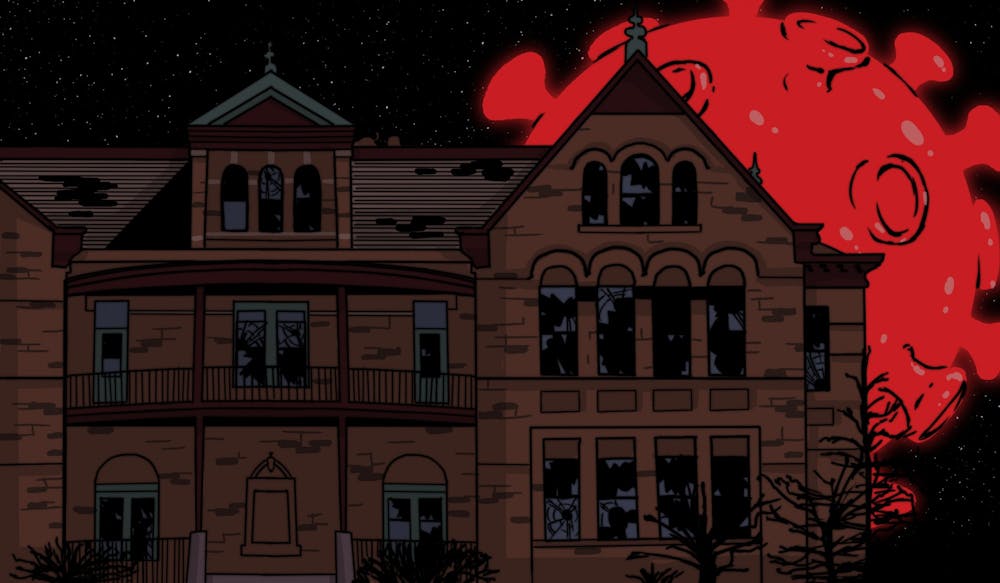The fall semester was manageable for Palash Mehta until its weight came crashing in.
As an international graduate student in computer science, Mehta concentrated on good grades, job interviews and employment after graduation so he could stay in the U.S. to pay off loans.
Mehta described that as an international student, "You are bounded by time," and in his last year at ASU, this past semester's pressure became palpable.
His anxiety heightened in the last two weeks of the semester, spending much of his time preparing for finals because he didn't want to see his grades drop after working so hard, with several tests scheduled to take place on the same day.
But then his mom called and told him his father was very sick. A few days later, his father was diagnosed with COVID-19, and Mehta flew home to India to help take care of his parents.
Mehta, like many students, struggled this year. As young adults, they may have been spared from the worst aspects of the virus, but students are not unfamiliar with its consequences. They saw loved ones get sick, worried for their safety and said they received subpar education while isolating indoors with little opportunity to connect.
"I felt terribly for the students," said Laurie Stoff, an honors faculty fellow at Barrett, The Honors College. "I felt like we as an institution failed them, like, we put them at risk. We made promises to them that we couldn't keep. But we also sort of accepted the idea that they were collateral damage."
ASU President Michael Crow and other University officials said the school met expectations and sufficiently delivered services to students and staff based on low COVID-19 infections, lack of virus transmission in classrooms and record-setting graduation rates.
READ MORE: Crow says despite imperfections, ASU managed COVID-19
"In many ways, the University was a safe harbor for people," said Joshua LaBaer, executive director of the Biodesign Institute in a weekly COVID-19 press briefing on Dec. 2. "The numbers of cases in the University itself were much lower than in the community at large."
Yet despite those successful numbers and health practices, the semester was anything but a success for some students and faculty.
It was stress-inducing; faculty felt voiceless; students failed courses for the first time; students learned little; there were no breaks to decompress; finals week was a disaster; ultimately, thousands still got sick despite the University's efforts and what health experts said was successful management of the virus.
Looking strictly at numbers may paint a successful semester as the University poses, but students and faculty said ASU failed when measuring success by the community's well-being.
Justine Hecht, an ASU graduate student in justice studies who teaches courses on social justice, said numbers do not reflect the quality of people's lives and they "will never, never, never be able to express the personal stresses that people are going through."
To call the semester a success is 'a big slap in the face to a lot of people'
For Crow and others to call the semester a success would require "ignoring the actual issues that happened," said Erika Garcia, a junior studying criminology and criminal justice, adding that Crow claiming the semester as successful is "a big slap in the face to a lot of the people who are struggling this semester."
"On paper, it was a successful year," she said, but Crow "made it unsuccessful the minute he decided to cancel fall break" and move up finals week. If students and faculty were viewed as people, not numbers, whose voices are important in the decision-making process, the semester could have been a success, she said.
Zaina Padda, a sophomore studying biomedical science and global health, said her entire inner-circle became infected with COVID-19 over the course of the semester. Every night, she would fall asleep in her apartment near campus to the sounds of parties just floors below.
"I just was astounded by how little control ASU had over its students," she said.
Padda didn't see a reprieve from this semester's stress. Classes didn't slow down. The parties and infections didn't stop. Even over Thanksgiving break, Padda didn't get a break, there was no time.
At times, she thought continuing with online classes might not be worth it since she was not learning. She would pass her classes, "but that's only from an academic standpoint — it came at the cost of my mental health," Padda said.
Nicole Martin, a senior studying chemical engineering, said this semester was the hardest she ever experienced, even when compared to her sophomore year when she was diagnosed with cancer. She spent weeks studying relentlessly for just one class, yet was still barely able to pass, something that has never happened to her before.
"Because everything is online, it's like there's this wall" when learning, she said.
Garcia said the semester only became worse as it went on, including feeling burnt out by October. Without fall break, 11 assignments stacked up, all of them being due during finals week.
READ MORE: Students are just trying to get by
Chloe Calissi, a sophomore studying digital marketing said the miscommunication from University administrators, to college deans and then to faculty members "led to a world of chaos that trickled down to us students the most."
Calissi had three finals on Dec. 3, and because she works two jobs to pay rent and one of her professors moved the final to Dec. 4, one of her workdays, she stayed up until the early hours of the morning to complete her last exam.
"We're paying so much money to learn, yet I couldn't learn because I was trying to catch up" when the University moved up finals week, Calissi said. "So I think if you look at the numbers, yeah, ASU was successful, but we're not numbers — we're humans — and most of us are really, really suffering."
COVID-19 was managed, yet students never saw the benefits
Since Aug. 1, over 3,000 students and employees tested positive for COVID-19. Health experts both in and out of the University said ASU managed the coronavirus well, especially compared to Arizona as a whole.
READ MORE: ASU ends fall semester with 3,357 cumulative COVID-19 cases
Will Humble, executive director of the Arizona Public Health Association, said there is a risk-cost-benefit analysis to consider when judging the success of reopening schools during the pandemic. He said students benefit when learning in-person, so the relatively low infection cost should have been worth it.
But for many students, the benefit of in-person instruction was not seen. Only around 20% of students chose to be on-campus each day, according to President Crow in a meeting with The State Press on Dec. 2.
Students instead often opted to attend classes virtually given fears of coronavirus, ASU Sync's accessibility and the reality that conducting a class with people in-person and online is challenging, students and faculty said.
Garcia said she tried to attend some of her classes in-person. In one class, the only person in the room was the teaching assistant while she and other students watched Zoom on a bigger screen. In another, only three students showed up, and the professor decided to just teach solely through Zoom after the first class.
Her other class had 10 students, but technology failed: Students couldn't talk to each other, online students couldn't hear the professor, and the professor would forget to address the students on Zoom.
She stopped attending her last in-person class when active COVID-19 cases within the ASU community began to surge again.
"Students voted with their feet," Stoff said. "They said 'This is not a good experience for me,' and they all chose to go online, not because it was easier or they gave up, but because they realize that actually, they would get more out of the class if they could interact with people."
Struggle abounded this semester, from students to faculty
Many students were excited to return but were let down by an academic and social experience lacking in substance. They thought the University would manage COVID-19, classes would have flexible instructors, they thought they would have something similar to the college experience they paid for. For many, they were wrong.
Faculty and students said they feel they have had no voice in the University's decision-making process, and the use of ASU Sync, which gave students the option to attend either in-person or through Zoom, was ultimately a failure.
Stoff and Hecht, both members of the Community of Care Coalition, a group of faculty, staff and students formed over the summer opposed to ASU reopening for in-person instruction, said the amount of money spent to make this semester happen could have been spent in ways to ensure students had everything they needed to succeed. ASU Sync was an unsound teaching practice from the start that did not consider input from most faculty, they said.
Students like Calissi, Garcia, Martin, Mehta and Padda were not alone. Across social media, students expressed concerns about the fall semester, how finals week was terrible, how they were lying on their kitchen floor crying because of this semester.
Hecht has wanted to be a teacher since she was a child, so it angers her when she receives emails from students explaining either themselves or loved ones tested positive for COVID-19 or students come to her panicked either because of their workload or a lack of support from other professors.
"That's not what learning looks like. You can't learn if you're stressed out, you just can't," she said.
Hecht, like everyone who spoke to The State Press, hoped the spring semester would be better and the University would become the community of care it has so frequently advertised.
"I know I don't feel cared for," Hecht said. "I know some of my fellow graduate students do not feel cared for. I know my undergrads don't feel cared for. I know my professors, my advisors don't feel cared for."
Actions speak louder than words, she said, "and I would like to see their actions follow the words that they're speaking."
Reach the reporter at wmyskow@asu.edu and follow @wmyskow on Twitter.
Like The State Press on Facebook and follow @statepress on Twitter.

Wyatt Myskow is the project manager at The State Press, where he oversees enterprise stories for the publication. He also works at The Arizona Republic, where he covers the cities of Peoria and Surprise.





